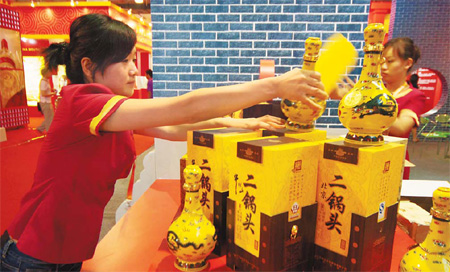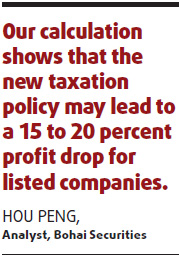The government's decision to rework the alcohol taxation policy may lead to prices of white liquor going up in the next few months, according to industry analysts.
|

A saleswoman arranging bottles of white liquor at an exhibition in Beijing recently. The government has changed the tax base and duties on white liquor to tackle tax evasion. [CFP]
|
The government's decision to rework the alcohol taxation policy may lead to prices of white liquor going up in the next few months, according to industry analysts.
The situation has been such that people like Li Mu, manager of a Moutai franchiser in Beijing's Chaoyang district, have been pulling all stops to shore up their white liquor stocks before the new policy comes into effect since August 1.
"Though we haven't received any formal notice from the manufacturers about a price increase, they have stopped new supplies for more than 20 days now," said Li. "As far as I know, they may probably increase the price by 2 to 5 percent, while the top brands may see bigger price hikes."
Currently, the tax on white liquor includes the specific duty of 1 yuan per kilogram, and the 20-percent ad valorem duty on the factory price. According to the new policy, the government has changed the tax base and duties on white liquor while retaining the 20-percent ad valorem duties.
The new policy aims to tackle tax evasion by white liquor makers. Under the earlier dispensation, white liquor makers could avoid paying much of the tax by selling the product to distributors at low prices and then resell them to shops at a much higher price.
A senior executive of a liquor maker estimated that the consumption tax paid by each enterprise would probably double after the new policy is put into practice.
At present, consumption tax is less than 10 percent of liquor makers' sales turnover. The sales turnover of Wuliangye, a famous brand in the industry, was 7.93 billion yuan in 2008 and it paid 417 million yuan as consumption tax last year.

According to Hou Peng, analyst, Bohai Securities, the new policy will increase the financial burden of white liquor manufacturers and cripple their profits.
"Our calculation shows that the new taxation policy may lead to a 15 to 20 percent profit drop for listed companies," said Hou. "Higher profits mean higher taxes for liquor manufacturers," he said.
Li Hui, analyst, Southwest Securities, feels that the new policy may lead to a decrease in the retained profits of major white liquor makers.
"Among them, Wuliangye may face the biggest impact. Additional tax caused by the minimum taxable value may take up some 23 percent of its retained profits," said Li. "Other firms like Luzhoulaojiao, Swellfun and Kweichow Moutai are also expected to see their retained profits fall by 20 to 10 percent."
Increasing prices to transfer part of the financial burden to customers would be a natural choice for white liquor makers, Li said.
In the past two months, the retail price of Moutai has jumped to 660 yuan to 680 yuan per bottle in some shops, from more than 500 yuan two months back.
With demand still exceeding supplies, Li is worried that his existing stocks may hardly meet customer demands in September and October.